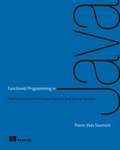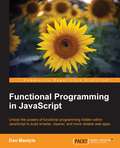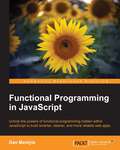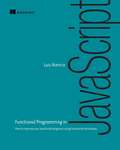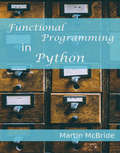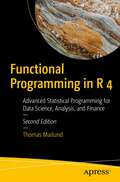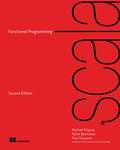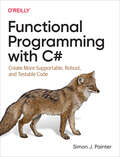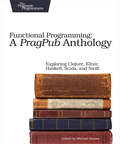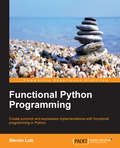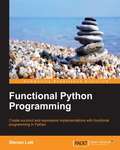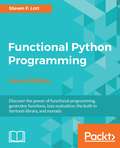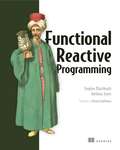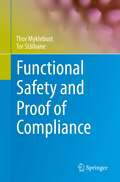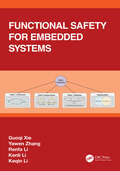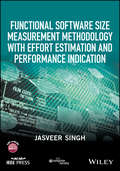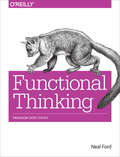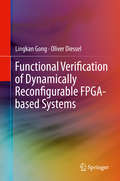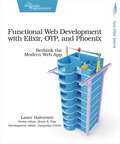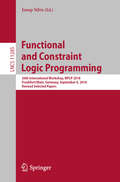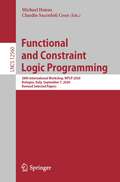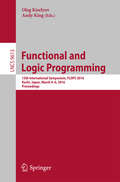- Table View
- List View
Functional Programming in Java: How functional techniques improve your Java programs
by Pierre-Yves SaumontSummaryFunctional Programming in Java teaches Java developers how to incorporate the most powerful benefits of functional programming into new and existing Java code. You'll learn to think functionally about coding tasks in Java and use FP to make your applications easier to understand, optimize, maintain, and scale. Purchase of the print book includes a free eBook in PDF, Kindle, and ePub formats from Manning Publications.About the TechnologyHere's a bold statement: learn functional programming and you'll be a better Java developer. Fortunately, you don't have to master every aspect of FP to get a big payoff. If you take in a few core principles, you'll see an immediate boost in the scalability, readability, and maintainability of your code. And did we mention that you'll have fewer bugs? Let's get started!About the BookFunctional Programming in Java teaches you how to incorporate the powerful benefits of functional programming into new and existing Java code. This book uses easy-to-grasp examples, exercises, and illustrations to teach core FP principles such as referential transparency, immutability, persistence, and laziness. Along the way, you'll discover which of the new functionally inspired features of Java 8 will help you most.What's InsideWriting code that's easier to read and reason aboutSafer concurrent and parallel programmingHandling errors without exceptionsJava 8 features like lambdas, method references, and functional interfacesAbout the ReaderWritten for Java developers with no previous FP experience.About the AuthorPierre-Yves Saumont is a seasoned Java developer with three decades of experience designing and building enterprise software. He is an R&D engineer at Alcatel-Lucent Submarine Networks.Table of ContentsWhat is functional programming? Using functions in Java Making Java more functional Recursion, corecursion, and memoization Data handling with lists Dealing with optional data Handling errors and exceptions Advanced list handling Working with laziness More data handling with trees Solving real problems with advanced trees Handling state mutation in a functional wayFunctional input/output Sharing mutable state with actors Solving common problems functionally
Functional Programming in JavaScript
by Dan MantylaIf you are a JavaScript developer interested in learning functional programming, looking for the quantum leap towards mastering the JavaScript language, or just want to become a better programmer in general, then this book is ideal for you. It is aimed at programmers involved in developing reactive frontend apps, server-side apps that wrangle with reliability and concurrency, and everything in between.
Functional Programming in JavaScript
by Dan Mantyla<P><P>Unlock the powers of functional programming hidden within JavaScript to build smarter, cleaner, and more reliable web apps <P><P>About This Book <P><P>Discover what functional programming is, why it's effective, and how it's used in JavaScript <P><P>Understand and optimize JavaScript's hidden potential as a true functional language <P><P>Explore the best coding practices for real-world applications <P><P>Who This Book Is For <P><P>If you are a JavaScript developer interested in learning functional programming, looking for the quantum leap towards mastering the JavaScript language, or just want to become a better programmer in general, then this book is ideal for you. It is aimed at programmers involved in developing reactive frontend apps, server-side apps that wrangle with reliability and concurrency, and everything in between. <P><P>What You Will Learn <P><P>Separate core logic from the program state to write more maintainable code <P><P>Replace ugly for loops with pure functions and recursion <P><P>Simplify code with method chains of pure, higher-order functions <P><P>Create more reliable code with closures and immutable data <P><P>Explore lazy evaluation strategies and what they can accomplish <P><P>Develop more powerful applications with currying and function composition <P><P>Use promises, functors, monads, and function factories <P><P>In Detail <P><P>This is a fast-paced guide that will help you to write real-world applications by utilizing a wide range of functional techniques and styles. <P><P>The book first explores the core concepts of functional programming common to all functional languages, with examples of their use in JavaScript. It's followed by a comprehensive roundup of functional programming libraries for JavaScript that minimizes the burden of digging deep into JavaScript to expose a set of tools that makes functional programming not just possible but highly convenient. The book then rounds off with an overview of methods to effectively use and mix functional programming with object-oriented programming.
Functional Programming in JavaScript: How to improve your JavaScript programs using functional techniques
by Luis AtencioSummaryFunctional Programming in JavaScript teaches JavaScript developers functional techniques that will improve extensibility, modularity, reusability, testability, and performance. Through concrete examples and jargon-free explanations, this book teaches you how to apply functional programming to real-life development tasksPurchase of the print book includes a free eBook in PDF, Kindle, and ePub formats from Manning Publications.About the TechnologyIn complex web applications, the low-level details of your JavaScript code can obscure the workings of the system as a whole. As a coding style, functional programming (FP) promotes loosely coupled relationships among the components of your application, making the big picture easier to design, communicate, and maintain.About the BookFunctional Programming in JavaScript teaches you techniques to improve your web applications - their extensibility, modularity, reusability, and testability, as well as their performance. This easy-to-read book uses concrete examples and clear explanations to show you how to use functional programming in real life. If you're new to functional programming, you'll appreciate this guide's many insightful comparisons to imperative or object-oriented programming that help you understand functional design. By the end, you'll think about application design in a fresh new way, and you may even grow to appreciate monads!What's InsideHigh-value FP techniques for real-world usesUsing FP where it makes the most senseSeparating the logic of your system from implementation detailsFP-style error handling, testing, and debuggingAll code samples use JavaScript ES6 (ES 2015)About the ReaderWritten for developers with a solid grasp of JavaScript fundamentals and web application design.About the AuthorLuis Atencio is a software engineer and architect building enterprise applications in Java, PHP, and JavaScript.Table of ContentsPART 1 THINK FUNCTIONALLYBecoming functional Higher-order JavaScript PART 2 GET FUNCTIONALFew data structures, many operations Toward modular, reusable code Design patterns against complexityPART 3 ENHANCING YOUR FUNCTIONAL SKILLSBulletproofing your codeFunctional optimizations Managing asynchronous events and data
Functional Programming in Kotlin
by Paul Chiusano Marco Vermeulen Rúnar BjarnasonIn Functional Programming in Kotlin you will learn: Functional programming techniques for real-world applications Write combinator libraries Common structures and idioms in functional design Simplicity and modularity (and fewer bugs!) Functional Programming in Kotlin is a reworked version of the bestselling Functional Programming in Scala, with all code samples, instructions, and exercises translated into the powerful Kotlin language. In this authoritative guide, you&’ll take on the challenge of learning functional programming from first principles. Complex concepts are demonstrated through exercises that you&’ll love to test yourself against. You&’ll start writing Kotlin code that&’s easier to read, easier to reuse, better for concurrency, and less prone to bugs and errors. Purchase of the print book includes a free eBook in PDF, Kindle, and ePub formats from Manning Publications. About the technology Improve performance, increase maintainability, and eliminate bugs! How? By programming the functional way. Kotlin provides strong support for functional programming, taking a pragmatic approach that integrates well with OO codebases. By applying the techniques you&’ll learn in this book, your code will be safer, less prone to errors, and much easier to read and reuse. About the book Functional Programming in Kotlin teaches you how to design and write Kotlin applications using typed functional programming. Offering clear examples, carefully-presented explanations, and extensive exercises, it moves from basic subjects like types and data structures to advanced topics such as stream processing. This book is based on the bestseller Functional Programming in Scala by Rúnar Bjarnason and Paul Chiusano. What's inside Functional programming techniques for real-world situations Common structures and idioms in functional design Simplicity, modularity, and fewer bugs! About the reader For Kotlin developers. No functional programming experience required. About the author Marco Vermeulen has two decades of programming experience on the JVM. Rúnar Bjarnason and Paul Chiusano are the authors of Functional Programming in Scala. Tabel of Contents PART 1 INTRODUCTION TO FUNCTIONAL PROGRAMMING 1 What is functional programming? 2 Getting started with functional programming in Kotlin 3 Functional data structures 4 Handling errors without exceptions 5 Strictness and laziness 6 Purely functional state PART 2 FUNCTIONAL DESIGN AND COMBINATOR LIBRARIES 7 Purely functional parallelism 8 Property-based testing 9 Parser combinators PART 3 COMMON STRUCTURES IN FUNCTIONAL DESIGN 10 Monoids 11 Monads and functors 12 Applicative and traversable functors PART 4 EFFECTS AND I/O 13 External effects and I/O 14 Local effects and mutable state 15 Stream processing and incremental I/O
Functional Programming in Python: Explore what functional programming is, how it is used, and the features of Python that support it
by Martin McBrideLearn functional programming concepts and techniques to build Python applications Key Features Study in detail all aspects of functional programming, including immutability, generators, and more Reinforce your learning through elaborate examples Learn how to implement advanced topics like closures, memoization, and monads in your applications Book Description Python supports four programming paradigms – imperative, procedural, object-oriented, and functional. Of these, functional programming is probably the least understood and the least used. This book covers several topics that are directly and indirectly related to functional programming. After a quick overview of functional programming and its characteristics, Functional Programming in Python explains the various concepts of Python, starting with functions. You'll learn how to change the value of an object by using mutability. You'll then look at recursion as a more functional alternative to looping for certain algorithms, and learn how memoization alleviates the limitations of recursion in certain situations. The book further explains how to use closures as function factories and how to handle errors and exceptions with functors and monads. By the end of this book, you'll have all the knowledge you need for developing your applications with functional programming in Python. What you will learn Understand the advantages and disadvantages of functional programming Use closures in your code to dynamically create functions Create your own iterators Use the general-purpose functools to create your own specialized reducing functions Study and implement list and generator comprehensions to create lists Create customized iterators with generators Who this book is for If you are a developer looking to create applications in Python using functional programming, this book is ideal for you. You will only need a basic knowledge of Python. Prior knowledge or experience of functional programming is not required.
Functional Programming in R 4: Advanced Statistical Programming for Data Science, Analysis, and Finance
by Thomas MailundMaster functions and discover how to write functional programs in R. In this book, updated for R 4, you'll learn to make your functions pure by avoiding side effects, write functions that manipulate other functions, and construct complex functions using simpler functions as building blocks.In Functional Programming in R 4, you’ll see how to replace loops, which can have side-effects, with recursive functions that can more easily avoid them. In addition, the book covers why you shouldn't use recursion when loops are more efficient and how you can get the best of both worlds.Functional programming is a style of programming, like object-oriented programming, but one that focuses on data transformations and calculations rather than objects and state. Where in object-oriented programming you model your programs by describing which states an object can be in and how methods will reveal or modify that state, in functional programming you model programs by describing how functions translate input data to output data. Functions themselves are considered to be data you can manipulate and much of the strength of functional programming comes from manipulating functions; that is, building more complex functions by combining simpler functions.What You'll LearnWrite functions in R 4, including infix operators and replacement functions Create higher order functionsPass functions to other functions and start using functions as data you can manipulateUse Filer, Map and Reduce functions to express the intent behind code clearly and safelyBuild new functions from existing functions without necessarily writing any new functions, using point-free programmingCreate functions that carry data along with themWho This Book Is ForThose with at least some experience with programming in R.
Functional Programming in Scala
by Paul Chiusano Runar BjarnasonSummaryFunctional Programming in Scala is a serious tutorial for programmers looking to learn FP and apply it to the everyday business of coding. The book guides readers from basic techniques to advanced topics in a logical, concise, and clear progression. In it, you'll find concrete examples and exercises that open up the world of functional programming.Purchase of the print book includes a free eBook in PDF, Kindle, and ePub formats from Manning Publications.About the TechnologyFunctional programming (FP) is a style of software development emphasizing functions that don't depend on program state. Functional code is easier to test and reuse, simpler to parallelize, and less prone to bugs than other code. Scala is an emerging JVM language that offers strong support for FP. Its familiar syntax and transparent interoperability with Java make Scala a great place to start learning FP. About the BookFunctional Programming in Scala is a serious tutorial for programmers looking to learn FP and apply it to their everyday work. The book guides readers from basic techniques to advanced topics in a logical, concise, and clear progression. In it, you'll find concrete examples and exercises that open up the world of functional programming.This book assumes no prior experience with functional programming. Some prior exposure to Scala or Java is helpful. What's InsideFunctional programming conceptsThe whys and hows of FPHow to write multicore programsExercises and checks for understandingAbout the AuthorsPaul Chiusano and Rúnar Bjarnason are recognized experts in functional programming with Scala and are core contributors to the Scalaz library.Table of ContentsPART 1 INTRODUCTION TO FUNCTIONAL PROGRAMMINGWhat is functional programming? Getting started with functional programming in ScalaFunctional data structuresHandling errors without exceptionsStrictness and lazinessPurely functional state PART 2 FUNCTIONAL DESIGN AND COMBINATOR LIBRARIESPurely functional parallelismProperty-based testingParser combinatorsPART 3 COMMON STRUCTURES IN FUNCTIONAL DESIGNMonoidsMonadsApplicative and traversable functorsPART 4 EFFECTS AND I/OExternal effects and I/OLocal effects and mutable stateStream processing and incremental I/O
Functional Programming in Scala, Second Edition
by Paul Chiusano Michael Pilquist Rúnar BjarnassonThis international bestseller has been revised with new exercises, annotations, and full coverage of Scala 3.In Functional Programming in Scala, Second Edition you will learn how to: Recognize and write purely functional code Work with errors without using exceptions Work with state and concurrency Interact with functional structures that define common behaviors Write code that performs I/O without sacrificing functional programming Functional Programming in Scala has helped over 30,000 developers discover the power of functional programming. You&’ll soon see why reviewers have called it &“mindblowing&”! The book smooths the complexity curve of functional programming, making it simple to understand the basics and intuitive to progress to more advanced topics. Concrete examples and exercises show you FP in the real world and reveal how it can improve your everyday coding practices. This second edition comes packed with the latest standards of FP, as well as full code updates to Scala 3, and its new language features. Foreword by Daniel Spiewak. About the Technology Functional code is easy to test, reuse, and parallelize, and it&’s practically immune to whole categories of state-related bugs. With its strong functional features, familiar syntax, and seamless interoperability with Java, there&’s no better place to start learning functional programming than the flexible Scala language. About the Book In Functional Programming with Scala, Second Edition you&’ll learn functional programming from first principles. Hands-on exercises and examples make it easy to start thinking and coding functionally. This revised edition contains extensive exercise annotations to help you explore FP in depth, along with steps to build your own functional libraries in Scala. Once the functional lightbulb goes on, you&’ll never look at coding the same way again. What&’s Inside Recognize and write purely functional code Work with errors without using exceptions Work with state and concurrency Interact with functional structures that define common behaviors About the Reader For Java or Scala programmers. No knowledge of functional programming required. About the Author Michael Pilquist is the lead maintainer of FS2, a functional streaming library, and contributes to the Typelevel ecosystem. Paul Chiusano and Rúnar Bjarnason are recognized experts in functional programming and authors of the first edition of Functional Programming with Scala. Table of Contents: PART 1 - INTRODUCTION TO FUNCTIONAL PROGRAMMING 1 What is functional programming? 2 Getting started with functional programming in Scala 3 Functional data structures 4 Handling errors without exceptions 5 Strictness and laziness 6 Purely functional state PART 2 - FUNCTIONAL DESIGN AND COMBINATOR LIBRARIES 7 Purely functional parallelism 8 Property-based testing 9 Parser combinators PART 3 - COMMON STRUCTURES IN FUNCTIONAL DESIGN 10 Monoids 11 Monads 12 Applicative and traversable functors PART 4 - EFFECTS AND I/O 13 External effects and I/O 14 Local effects and mutable state 15 Stream processing and incremental I/O
Functional Programming with C#: Create More Supportable, Robust, and Testable Code
by Simon J. PainterAfter decades of relative obscurity, functional programming is finally coming into its own. With concise, easy-to-read code that supports asynchronous, concurrent processing, aspects of functional programming have begun to appear in several traditionally object-oriented languages such as C# and Java. This practical book shows C# programmers how to use functional programming features without having to navigate an entirely new language.Because of the shared runtime environment common to C# and F# languages, it's possible to use most of F#'s functional features in C# as well. Author Simon J. Painter explains how you can write functional code in C# right away, without having to install dependencies or features newer than .NET 3. You'll learn why functional programming concepts can bring immediate benefit to your work.Learn what functional programming is and how it originatedDiscover features of the functional paradigm using a more familiar languageStart coding functionally in C# right away, without relying on third-party librariesWrite code that's more robust, less error prone, and easier to testExamine less conventional ways to look at structures available in C#Explore the practicalities of using functional C# in a business environment
Functional Programming: Exploring Clojure, Elixir, Haskell, Scala, and Swift
by Michael SwaineExplore functional programming and discover new ways of thinking about code. You know you need to master functional programming, but learning one functional language is only the start. In this book, through articles drawn from PragPub magazine and articles written specifically for this book, you'll explore functional thinking and functional style and idioms across languages. Led by expert guides, you'll discover the distinct strengths and approaches of Clojure, Elixir, Haskell, Scala, and Swift and learn which best suits your needs. Contributing authors: Rich Hickey, Stuart Halloway, Aaron Bedra, Michael Bevilacqua-Linn, Venkat Subramaniam, Paul Callaghan, Jose Valim, Dave Thomas, Natasha Murashev, Tony Hillerson, Josh Chisholm, and Bruce Tate. Functional programming is on the rise because it lets you write simpler, cleaner code, and its emphasis on immutability makes it ideal for maximizing the benefits of multiple cores and distributed solutions. So far nobody's invented the perfect functional language - each has its unique strengths. In Functional Programming: A PragPub Anthology, you'll investigate the philosophies, tools, and idioms of five different functional programming languages.See how Swift, the development language for iOS, encourages you to build highly scalable apps using functional techniques like map and reduce. Discover how Scala allows you to transition gently but deeply into functional programming without losing the benefits of the JVM, while with Lisp-based Clojure, you can plunge fully into the functional style. Learn about advanced functional concepts in Haskell, a pure functional language making powerful use of the type system with type inference and type classes. And see how functional programming is becoming more elegant and friendly with Elixir, a new functional language built on the powerful Erlang base.The industry has been embracing functional programming more and more, driven by the need for concurrency and parallelism. This collection of articles will lead you to mastering the functional approach to problem solving. So put on your explorer's hat and prepare to be surprised. The goal of exploration is always discovery.What You Need:Familiarity with one or more programming languages.
Functional Python Programming
by Steven LottThis book is for developers who want to use Python to write programs that lean heavily on functional programming design patterns. You should be comfortable with Python programming, but no knowledge of functional programming paradigms is needed.
Functional Python Programming
by Steven Lott<P><P>Key Features <P><P>Implement common functional programming design patterns and techniques in Python <P><P>Learn how to choose between imperative and functional approaches based on expressiveness, clarity, and performance <P><P>Apply functional Python to common Exploratory Data Analysis (EDA) programming problems <P><P>Book Description <P><P>Python’s easy-to-learn and extensible abilities offer a number of functional programming features for you to bring into your workflow, especially in the realm of data science. <P><P>If you’re a Python developer who wants to discover how to take the power of functional programming and bring it into your own programs then this book is essential for you, even if you know next to nothing about the paradigm. Starting with a general overview of functional concepts you’ll explore common functional features such as first-class and higher-order functions, pure functions and more, and how these are accomplished in Python to give you the core foundations you’ll build upon. After that, you’ll discover common functional optimizations for Python to help your apps reach even higher speeds. You'll also explore data preparation techniques and data exploration in depth, along with learning how the Python standard library fits the functional programming model. Finally, to top off your journey into the world of function Python you’ll at look at the PyMonad project and some larger examples to put everything into perspective. <P><P>With Functional Python Programming by your side you’ll understand the core concepts of function Python, its impact on the programming workflow, and how to implement it in Python, giving you the ability to take your applications to an even higher level. <P><P>What you will learn <P><P>Use Python's generator functions and generator expressions to work with collections in a non-strict (or lazy) manner <P><P>Utilize Python library modules including itertools, functools, multiprocessing, and concurrent.futures for efficient functional programs <P><P>Use Python strings with object-oriented suffix notation and prefix notation <P><P>Avoid stateful classes by making use of families of tuples <P><P>Design and implement decorators to create composite functions <P><P>Use functions like max(), min(), map(), filter(), and sorted() <P><P>Write advanced higher-order functions
Functional Python Programming - Second Edition: Discover The Power Of Functional Programming, Generator Functions, Lazy Evaluation, The Built-in Itertools Library, And Monads, 2nd Edition
by Steven F. LottPython is an easy-to-learn and extensible programming language that offers a number of functional programming features. This practical guide demonstrates the Python implementation of a number of functional programming techniques and design patterns. Through this book, you’ll understand what functional programming is all about, its impact on the programming workflow, why it's important, and how to implement it in Python.
Functional Python Programming: Discover the power of functional programming, generator functions, lazy evaluation, the built-in itertools library, and monads, 2nd Edition
by Steven F. LottCreate succinct and expressive implementations with functional programming in PythonKey Features Learn how to choose between imperative and functional approaches based on expressiveness, clarity, and performance Get familiar with complex concepts such as monads, concurrency, and immutability Apply functional Python to common Exploratory Data Analysis (EDA) programming problemsBook DescriptionIf you’re a Python developer who wants to discover how to take the power of functional programming (FP) and bring it into your own programs, then this book is essential for you, even if you know next to nothing about the paradigm. Starting with a general overview of functional concepts, you’ll explore common functional features such as first-class and higher-order functions, pure functions, and more. You’ll see how these are accomplished in Python 3.6 to give you the core foundations you’ll build upon. After that, you’ll discover common functional optimizations for Python to help your apps reach even higher speeds. You’ll learn FP concepts such as lazy evaluation using Python’s generator functions and expressions. Moving forward, you’ll learn to design and implement decorators to create composite functions. You'll also explore data preparation techniques and data exploration in depth, and see how the Python standard library fits the functional programming model. Finally, to top off your journey into the world of functional Python, you’ll at look at the PyMonad project and some larger examples to put everything into perspective. What you will learn Use Python's generator functions and generator expressions to work with collections in a non-strict (or lazy) manner Utilize Python library modules including itertools, functools, multiprocessing, and concurrent features to ensure efficient functional programs Use Python strings with object-oriented suffix notation and prefix notation Avoid stateful classes with families of tuples Design and implement decorators to create composite functions Use functions such as max(), min(), map(), filter(), and sorted() Write higher-order functionsWho this book is forThis book is for Python developers who would like to perform Functional programming with Python. Python Programming knowledge is assumed.
Functional Reactive Programming
by Stephen BlackheathSummaryFunctional Reactive Programming teaches the concepts and applications of FRP. It offers a careful walk-through of core FRP operations and introduces the concepts and techniques you'll need to use FRP in any language.Purchase of the print book includes a free eBook in PDF, Kindle, and ePub formats from Manning Publications.About the TechnologyToday's software is shifting to more asynchronous, event-based solutions. For decades, the Observer pattern has been the go-to event infrastructure, but it is known to be bug-prone. Functional reactive programming (FRP) replaces Observer, radically improving the quality of event-based code.About the BookFunctional Reactive Programming teaches you how FRP works and how to use it. You'll begin by gaining an understanding of what FRP is and why it's so powerful. Then, you'll work through greenfield and legacy code as you learn to apply FRP to practical use cases. You'll find examples in this book from many application domains using both Java and JavaScript. When you're finished, you'll be able to use the FRP approach in the systems you build and spend less time fixing problems. What's InsideThink differently about data and eventsFRP techniques for Java and JavaScriptEliminate Observer one listener at a timeExplore Sodium, RxJS, and Kefir.js FRP systemsAbout the ReaderReaders need intermediate Java or JavaScript skills. No experience with functional programming or FRP required.About the AuthorsStephen Blackheath and Anthony Jones are experienced software developers and the creators of the Sodium FRP library for multiple languages. Foreword by Heinrich Apfelmus. Illustrated by Duncan Hill.Table of ContentsStop listening! Core FRP Some everyday widget stuff Writing a real application New concepts FRP on the web Switch Operational primitives Continuous time Battle of the paradigms Programming in the real world Helpers and patterns Refactoring Adding FRP to existing projects Future directions
Functional Safety and Proof of Compliance
by Thor Myklebust Tor StålhaneThis book aims to facilitate and improve development work related to all documents and information required by functional safety standards. Proof of Compliance (PoC) is important for the assessor and certification bodies when called up to confirm that the manufacturer has developed a software system according to the required safety standards. While PoC documents add functionality to the product neither for the developer nor for the customer, they do add confidence and trust to the product and ease certification, and as such are important for the product’s value. In spite of this added value, the documentation needed for PoC is often developed late in the project and in a haphazard manner. This book aims at developers, assessors, certification bodies, and purchasers of safety instrumented systems and informs the reader about the most important PoC documents. A typical PoC documentation encompasses 50 to 200 documents, several of which are named in the safety standards (e.g., 82 documents in IEC 61508:2010 series, 101 documents in EN 5012X series and 106 work products in ISO 26262:2018 series). These documents also include further references, typically one to twenty of them, and the total number of pages developed by the manufacturer varies between 2000 and 10000 pages. The book provides guidance and examples what to include in the relevant plans and documents.
Functional Safety for Embedded Systems
by Kenli Li Guoqi Xie Renfa Li Keqin Li Yawen ZhangThis book uses automotive embedded systems as an example to introduce functional safety assurance and safety-aware cost optimization. The book explores functional safety assurance from the perspectives of verification, enhancement, and validation. The functional safety assurance methods implement a safe and efficient assurance system that integrates safety verification, enhancement, and validation. The assurance methods offered in this book could provide a reasonable and scientific theoretical basis for the subsequent formulation of automotive functional safety standards. The safety-aware cost optimization methods divide cost types according to the essential differences of various costs in system design and establish reasonable models based on different costs. The cost optimization methods provided in this book could give appropriate cost optimization solutions for the cost-sensitive automotive industry, thereby achieving effective cost management and control. Functional safety assurance methods and safety-aware cost optimization support each other and jointly build the architecture of functional safety design methodologies for automotive embedded systems. The work aspires to provide a relevant reference for students, researchers, engineers, and professionals working in this area or those interested in hardware cost optimization and development cost optimization design methods based on ensuring functional safety in general.
Functional Software Size Measurement Methodology with Effort Estimation and Performance Indication
by Jasveer SinghPresents a new, effective methodology in software size measurement Software size measurement is an extremely important and highly specialized aspect of the software life cycle. It is used for determining the effort and cost estimations for project planning purposes of a software project’s execution, and/or for other costing, charging, and productivity analysis purposes. Many software projects exceed their allocated budget limits because the methodologies currently available lack accuracy. The new software size measurement methodology presented in this book offers a complete procedure that overcomes the deficiencies of the current methodologies, allowing businesses to estimate the size and required effort correctly for all their software projects developed in high level languages. The Functional Software Size Measurement Methodology with Effort Estimation and Performance Indication (FSSM) allows for projects to be completed within the defined budget limits by obtaining accurate estimations. The methodology provides comprehensive and precise measurements of the complete software whereby factual software size determination, development effort estimation, and performance indications are obtained. The approach is elaborate, effective and accurate for software size measurement and development effort estimation, avoiding inaccurate project planning of software projects. Key features: Pinpoints one of the major, originating root causes of erroneous planning by disclosing hidden errors made in software size measurement, and consequently in effort estimates and project planning All the major relevant and important aspects of software size measurement are taken into consideration and clearly presented to the reader Functional Software Size Measurement Methodology with Effort Estimation and Performance Indication is a vital reference for software professionals and Master level students in software engineering. For further information and materials relating to this book, such as FSSM 1.0 Calculations Template for Results Tables and Graphs, containing Calculations, and Results Tables/Graphs for the Mini FSSM Example, please visit the following two accompanying websites: http://booksupport.wiley.com www.fssm.software
Functional Thinking: Paradigm Over Syntax
by Neal FordIf you’re familiar with functional programming basics and want to gain a much deeper understanding, this in-depth guide takes you beyond syntax and demonstrates how you need to think in a new way. Software architect Neal Ford shows intermediate to advanced developers how functional coding allows you to step back a level of abstraction so you can see your programming problem with greater clarity.Each chapter shows you various examples of functional thinking, using numerous code examples from Java 8 and other JVM languages that include functional capabilities. This book may bend your mind, but you’ll come away with a much better grasp of functional programming concepts.Understand why many imperative languages are adding functional capabilitiesCompare functional and imperative solutions to common problemsExamine ways to cede control of routine chores to the runtimeLearn how memoization and laziness eliminate hand-crafted solutionsExplore functional approaches to design patterns and code reuseView real-world examples of functional thinking with Java 8, and in functional architectures and web frameworksLearn the pros and cons of living in a paradigmatically richer worldIf you’re new to functional programming, check out Josh Backfield’s book Becoming Functional.
Functional Verification of Dynamically Reconfigurable FPGA-based Systems
by Lingkan Gong Oliver DiesselThis book analyzes the challenges in verifying Dynamically Reconfigurable Systems (DRS) with respect to the user design and the physical implementation of such systems. The authors describe the use of a simulation-only layer to emulate the behavior of target FPGAs and accurately model the characteristic features of reconfiguration. Readers are enabled with this simulation-only layer to maintain verification productivity by abstracting away the physical details of the FPGA fabric. Two implementations of the simulation-only layer are included: Extended Re Channel is a System C library that can be used to check DRS designs at a high level; ReSim is a library to support RTL simulation of a DRS reconfiguring both its logic and state. Through a number of case studies, the authors demonstrate how their approach integrates seamlessly with existing, mainstream DRS design flows and with well-established verification methodologies such as top-down modeling and coverage-driven verification.
Functional Web Development with Elixir, OTP, and Phoenix: Rethink the Modern Web App
by Lance HalvorsenElixir and Phoenix are generating tremendous excitement as an unbeatable platform for building modern web applications. For decades OTP has helped developers create incredibly robust, scalable applications with unparalleled uptime. Make the most of them as you build a stateful web app with Elixir, OTP, and Phoenix. Model domain entities without an ORM or a database. Manage server state and keep your code clean with OTP Behaviours. Layer on a Phoenix web interface without coupling it to the business logic. Open doors to powerful new techniques that will get you thinking about web development in fundamentally new ways. Elixir and OTP provide exceptional tools to build rock-solid back-end applications that scale. In this book, you'll build a web application in a radically different way, with a back end that holds application state. You'll use persistent Phoenix Channel connections instead of HTTP's request-response, and create the full application in distinct, decoupled layers. In Part 1, start by building the business logic as a separate application, without Phoenix. Model the application domain with Elixir functions and simple data structures. By keeping state in memory instead of a database, you can reduce latency and simplify your code. In Part 2, add in the GenServer Behaviour to make managing in-memory state a breeze. Create a supervision tree to boost fault tolerance while separating error handling from business logic. Phoenix is a modern web framework you can layer on top of business logic while keeping the two completely decoupled. In Part 3, you'll do exactly that as you build a web interface with Phoenix. Bring in the application from Part 2 as a dependency to a new Phoenix project. Then use ultra-scalable Phoenix Channels to establish persistent connections between the stateful server and a stateful front-end client. You're going to love this way of building web apps! What You Need: You'll need a computer that can run Elixir version 1.5 or higher and Phoenix 1.3 or higher. Some familiarity with Elixir and Phoenix is recommended.
Functional and Constraint Logic Programming: 26th International Workshop, WFLP 2018, Frankfurt/Main, Germany, September 6, 2018, Revised Selected Papers (Lecture Notes in Computer Science #11285)
by Josep SilvaThis book constitutes the refereed post-conference proceedings of the 26th International Workshop on Functional and Constraint Logic Programming, WFLP 2018, held in Frankfurt/Main, Germany, in September 2018. From the 19 full papers submitted,12 were accepted for presentation at the workshop. During a second review after the workshop, 10 papers were accepted for inclusion in this volume. The papers cover different programming areas of functional and logic programming, including code generation, verification, and debugging. They are organized in the following topical sections: compilers and code generation; debugging and testing; and foundations of functional logic programming.
Functional and Constraint Logic Programming: 28th International Workshop, WFLP 2020, Bologna, Italy, September 7, 2020, Revised Selected Papers (Lecture Notes in Computer Science #12560)
by Michael Hanus Claudio Sacerdoti CoenThis book constitutes the refereed post-conference proceedings of the 28th International Workshop on Functional and Constraint Logic Programming, WFLP 2020, held in Bologna, Italy, in September 2020.Due to the COVID-19, the workshop was held online. From the 19 full papers submitted, 8 were accepted for presentation at the workshop. The accepted papers cover different programming areas of functional and logic programming, including code generation, verification, and debugging.
Functional and Logic Programming
by Andy King Oleg KiselyovThis bookconstitutes the proceedings of the 13th International Symposium on Functionaland Logic Programming, FLOPS 2016, held in Kochi, Japan, in March 2016. The 14 papers presented in this volume were carefully reviewed and selectedfrom 36 submissions. They cover the following topics: functional and logicprogramming; program transformation and re-writing; and extracting programsfrom proofs of their correctness.
